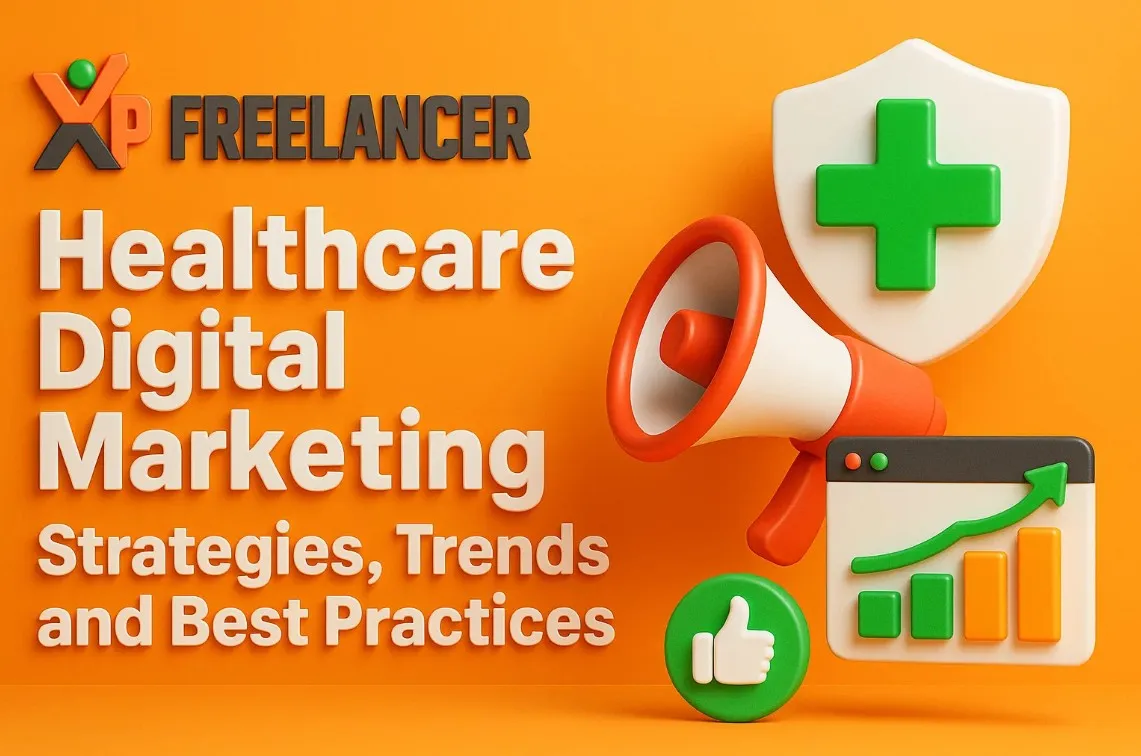10 min read Healthcare Digital Marketing: Strategies, Trends, and Best Practices

In today’s fast-paced digital world, patients no longer rely solely on word-of-mouth or traditional advertising to choose healthcare providers. Instead, they turn to Google, social media, online reviews, and medical websites. This shift makes healthcare digital marketing not just an option but a necessity for clinics, hospitals, and practitioners.
Healthcare organizations must embrace digital marketing to stay competitive, build trust, and reach their target audience effectively. In this guide, we’ll explore the top digital marketing strategies, industry-specific trends, compliance tips, and best practices that can help healthcare providers thrive online.
1. What is Healthcare Digital Marketing?
Healthcare digital marketing refers to the use of online channels and strategies to promote medical services, products, or institutions. It includes everything from optimizing a clinic’s website for Google searches to running ads on Facebook or sharing health tips via email.
The goal is to:
- Attract new patients
- Educate and retain existing ones
- Build brand authority
- Improve communication and accessibility
2. Why is Digital Marketing Important in Healthcare?
Here are key reasons why digital marketing is crucial in healthcare:
✅ Patient Behavior Has Changed
Most patients search online before visiting a doctor. According to Google Health Trends, 77% of patients begin their journey with a search engine.
✅ Competition is Growing
With thousands of clinics and providers online, it’s essential to stand out with targeted marketing strategies.
✅ Builds Trust and Transparency
Content like blogs, testimonials, and Q&A videos build trust in your expertise and services.
✅ Drives Patient Engagement
Social media and email campaigns encourage interaction, education, and repeat visits.
✅ Cost-Effective with Measurable ROI
Digital ads, SEO, and email marketing are often more cost-effective and measurable than TV or newspaper campaigns.
3. Key Healthcare Digital Marketing Strategies
a. Search Engine Optimization (SEO)
SEO helps your website appear at the top of search engine results when people search for terms like “dentist near me” or “pediatrician in [city].”
SEO tips for healthcare:
- Use local keywords (e.g., “urgent care in Chicago”)
- Optimize for mobile users
- Create service-specific pages (e.g., “diabetes treatment”)
- Add your practice to Google Business Profile
- Use schema markup for medical content
b. Content Marketing
Quality content builds credibility and educates patients. It includes:
- Blogs (e.g., “5 Causes of Lower Back Pain”)
- FAQs
- Infographics
- Health guides
- Patient success stories
Benefits:
- Drives traffic
- Improves SEO
- Answers patient queries
- Positions you as an expert
c. Pay-Per-Click (PPC) Advertising
Platforms like Google Ads and Facebook allow targeted advertising. For example, you can run an ad for “Same-Day Appointments Available” for people searching locally.
PPC tips:
- Use geo-targeting
- Create compelling ad copy
- Use landing pages with clear CTAs (Call-to-Action)
- Track conversions (form fills, appointment bookings)
d. Social Media Marketing
Social platforms like Facebook, Instagram, and LinkedIn are great for:
- Promoting awareness campaigns (e.g., “Breast Cancer Awareness Month”)
- Sharing health tips
- Running contests or events
- Humanizing your brand through behind-the-scenes posts
Best platforms:
- Facebook for older audiences and community engagement
- Instagram for visuals (e.g., dermatology, aesthetics)
- LinkedIn for B2B medical marketing
e. Email Marketing
Email marketing is still one of the highest ROI channels. It’s perfect for:
- Sending appointment reminders
- Sharing newsletters or blog posts
- Promoting seasonal services (e.g., flu shots)
- Patient satisfaction surveys
Use automation tools like Mailchimp, HubSpot, or ActiveCampaign.
f. Online Reputation Management
Your reviews on Google, Healthgrades, and Zocdoc affect patient decisions.
Tips:
- Ask happy patients to leave reviews
- Respond to reviews (both positive and negative)
- Address concerns promptly and professionally
4. Current Trends in Healthcare Digital Marketing
1. Voice Search Optimization
More users are asking Siri, Alexa, or Google Assistant for medical help. Optimize your content for voice search using natural language and questions like:
- “What are the symptoms of flu?”
- “Where is the nearest urgent care?”
2. Video Marketing
Patients prefer watching over reading. Explainer videos, doctor introductions, and patient testimonials can build trust fast.
3. AI & Chatbots
Automated chatbots on websites can:
- Answer FAQs
- Schedule appointments
- Provide health info 24/7
4. Personalized Marketing
Using CRM data to segment emails, ads, or web content based on patient behavior improves engagement.
5. Telemedicine Integration
Promoting telehealth services online—via PPC ads or landing pages—has become essential post-COVID.
5. Challenges and Compliance: HIPAA and Data Privacy
Healthcare marketing must follow strict regulations to protect patient data.
Key rules to follow:
- Do NOT disclose any personal health information (PHI) without consent.
- Email campaigns must comply with HIPAA and CAN-SPAM laws.
- Use secure forms for patient submissions (SSL encryption).
- Keep all patient data on HIPAA-compliant platforms.
Bonus Tip: Avoid using patient photos or testimonials without written authorization.
6. Best Practices for Healthcare Marketing
- ✅ Mobile-first design: Ensure your website is fast and mobile-optimized.
- ✅ Educational over promotional: Be informative, not salesy.
- ✅ Consistent branding: Maintain a uniform tone, color scheme, and logo across all channels.
- ✅ Clear CTAs: Use buttons like “Book Now,” “Call Today,” or “Schedule a Free Consultation.”
- ✅ Track performance: Use Google Analytics, Hotjar, or HubSpot to measure ROI.
- ✅ Test everything: A/B test your emails, landing pages, and ad creatives.
7. Tools and Platforms for Healthcare Marketers
8. Final Thoughts
The healthcare industry is rapidly evolving, and digital transformation is no longer optional. A strong digital marketing strategy can help you reach more patients, build lasting relationships, and grow your practice sustainably.
To succeed, focus on being:
- Patient-centered
- Transparent
- Consistent
- Compliant with legal regulations
Whether you're a private practice, hospital, or healthcare startup, investing in digital marketing today is an investment in your clinic’s future.
Frequently Asked Questions (FAQs)
1. Can doctors advertise online?
Yes, but they must follow ethical and legal guidelines, especially regarding PHI and patient privacy.
2. How often should I post on social media?
At least 2–3 times a week to stay relevant and keep your audience engaged.
3. What is the best platform for healthcare ads?
Google Ads for search intent; Facebook and Instagram for brand awareness.
4. Do I need a blog for my medical website?
Yes. Blogging improves SEO, educates patients, and builds credibility.
5. What’s the ROI of healthcare digital marketing?
While it varies, email marketing and SEO typically offer high ROI when done consistently.
6. Is telemedicine marketing different?
Slightly. It needs to highlight virtual care, ease of access, and secure communication.
7. What’s the biggest mistake in healthcare digital marketing?
Neglecting mobile users and forgetting to optimize for local SEO.
8. Should I hire a healthcare marketing agency?
Yes, if you lack time or expertise. Agencies can scale your efforts professionally.
9. How long does it take to see results with SEO?
Usually 3–6 months for noticeable improvements in rankings and traffic.
10. Are there HIPAA-compliant marketing platforms?
Yes. Tools like Paubox, LuxSci, and others offer HIPAA-compliant email marketing and hosting.




































































